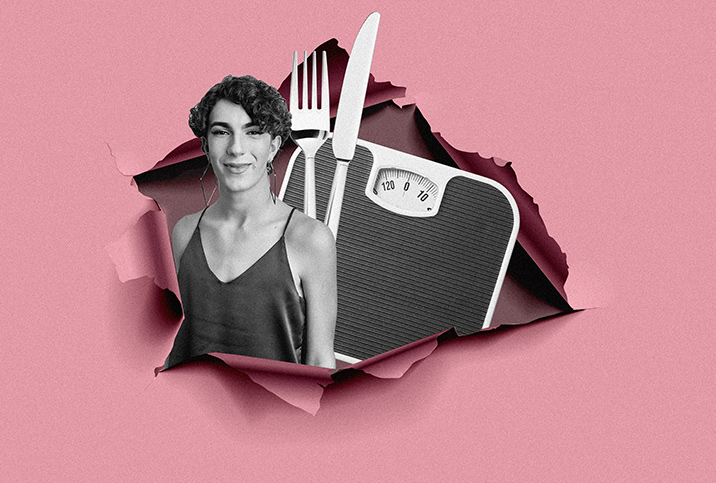Recognize the Signs and Symptoms of Bulimia Nervosa

Bulimia nervosa is an eating disorder characterized by regular bouts of overeating followed by self-induced vomiting or purging, and excessive dieting and exercise, all in an effort to satisfy personal concerns about body weight. Eating is not driven by hunger even though large quantities of food are consumed in a short period of time, often followed by feelings of guilt and remorse.
Statistics published by the American Addiction Centers indicate that about 1.5 percent of the female population in the United States and 0.5 percent of the male population experience bulimia at some point during their lifetimes, which translates to more than 6 million people.
What are the symptoms of bulimia nervosa?
There are numerous signs and symptoms of bulimia nervosa. People with bulimia nervosa typically experience binge episodes, in which they eat a much larger than typical amount of food in a short period of time, often feeling out of control while doing so, and then engage in some type of purging behavior.
However, choosing to have a very large meal or several meals is not a "binge." A key element of a binge is feeling a loss of control about what and how much you are eating or "having an internal sense of feeling absent while you're eating," explained Melissa Spann, L.M.H.C., the chief clinical officer of Monte Nido & Affiliates in Miami.
She added that if you have bulimia nervosa, you likely feel excessively concerned with body weight, shape or size. You probably engage in some sort of compensatory behavior, such as abusing laxatives or diuretics, self-inducing vomiting or overexercising. You likely also struggle with feelings of shame.
Common symptoms of eating disorders in general are reported to be low sexual desire alongside feelings of anger, anxiety, depression and disillusionment. Bulimia is linked to disordered relationships, because sufferers may withdraw from others as their obsession with food becomes all they care about.
People who binge often feel insecure about controlling themselves, which can lead to brief moments of sexual impulsivity, but mostly, there's a lack of enthusiasm for frequent or consistent sexual behavior.
"A huge piece we see with bulimia is the experiences around shame," Spann said. "We see a significant amount of shame associated with purging behaviors."
People with bulimia nervosa often enter a shame cycle, which leads to isolating, withdrawing from family and friends, skipping parties or social gatherings, and sometimes stealing or hoarding food, she added.
Another sign of bulimia nervosa is major fluctuations or changes in weight, though not everyone experiences these changes. People often have the perception that having an eating disorder is marked by a significant loss in weight, but it isn't always. Some people's weight fluctuates up and down while having bulimia nervosa and some people's weight does not change.
While weight fluctuation can be an important sign of an eating disorder, not everyone experiences this symptom.
Signs to look out for if you suspect a loved one may have bulimia nervosa include noticing if they're restricting their eating, feeling out of control about food or engaging in compensatory behaviors.
"A really common warning sign of bulimia is someone automatically getting up [to go to the bathroom] as soon as a meal is done," Spann said.
They may talk excessively about their plans to work out and be unwilling to make changes to those plans, skip a workout or reschedule a workout for something like a social activity. It's likely they will start withdrawing and isolating more often. A key sign that a person has bulimia nervosa is when they become hyper-concerned with the shape and size of their body.
They also might have lots of empty wrappers and takeout containers in their car or home, Spann added.
Diagnosis and testing
There's no blood test to determine whether someone has bulimia, Spann noted. This can be difficult and frustrating for both the person seeking treatment and their family or friends who want answers and concrete solutions in order to move forward.
To get a working diagnosis, you need to see a mental health professional, doctor or dietitian. They may ask a series of questions partly based on the diagnostic criteria and definition for an eating disorder found in the Diagnostic and Statistical Manual of Mental Disorders, 5th Edition (DSM-5), Spann explained. They also may use assessments such as the Eating Disorder Inventory (EDI) or Eating Disorder Examination Questionnaire (EDEQ).
"The subscales associated with those [assessments] give us an incredible amount of diagnostic information according to what that person is struggling with," Spann added.
If you think you may have bulimia nervosa or any eating disorder, seek help right away. Spann suggested reaching out to a therapist, dietitian or your primary care provider. The National Eating Disorders Association (NEDA) has a helpline available 24/7 to call, text or chat online. Volunteers can provide support and direct you to resources and treatment options.
If you have health insurance, you should start by contacting your doctor and asking them for a list of mental health providers within your network. Research each provider they recommend and look for someone who specializes in eating disorders. Visit their website, read their biography and see if the person or organization resonates with you.
If you're nervous about saying you suspect you have an eating disorder, you could explain that you're struggling with body image and food or just simply tell them you'd like to schedule an appointment. There's no need to be shy as these folks have heard everything before and that's what makes them such an important resource for you.
If you don't have insurance, you can do an online search for mental health providers in your area. Without insurance, you will likely have to pay out of pocket for services. If this is the case, consider looking for eating disorder treatment centers near you and call to see if they are accepting new patients and if they have any free programs. Also, contact your local health department for your city or county as they may also have free mental health services.
What happens if bulimia goes undiagnosed?
"There are so many medical complications that could arise with long-term bulimia nervosa not going diagnosed," Spann said. "There are lots of physical symptoms, medical symptoms, significant gastrointestinal-related challenges, and overall, there are mental health challenges."
Heart health is also a serious concern with an eating disorder.
According to NEDA, consuming fewer calories than you need causes the body to break down its own tissue to use for fuel. Muscles are some of the first organs broken down, and the most important muscle in the body is the heart. Pulse and blood pressure begin to drop as the heart has less fuel to pump blood and fewer cells with which to pump. The risk for heart failure rises as the heart rate and blood pressure levels sink lower and lower.
Here are the major medical complications that can arise from bulimia nervosa:
- Bacterial infections
- Blocked intestines from solid masses of undigested food
- Blood sugar fluctuations
- Constipation
- Difficulty concentrating
- Endocrine complications
- Feeling full after eating only small amounts of food
- Nausea and vomiting
- Neurological damage
- Obsessing about food
- Stomach pain and bloating
- Stomach rupture from binge eating
- Vomiting can wear down the esophagus and cause it to rupture
Myths about bulimia nervosa
Due in part to the complex nature of bulimia, it's no surprise misinformation clouds the reality of this disorder. The goal is to have an open dialogue on bulimia, and the best way to do that is to eliminate the common myths and let reality steer you in the right direction.
Here are three major misunderstandings that you need to discard from your thinking:
Misconceptions about body image
"As it comes to bulimia, there is a misconception or myth that people in larger bodies or different sizes and shapes can't be struggling," Spann explained. "This is a dangerous myth that often causes eating disorders to go undiagnosed, untreated or sometimes even encouraged by medical professionals. If someone in a larger body goes to the doctor, many times, the first observation they're given is, 'Well, you should be losing weight.'"
Stigma about weight can cause medical providers to completely miss or ignore signs that someone in a larger body may have an eating disorder, and encouraging weight loss can worsen the situation.
Misconceptions about race
"I think that one of the biggest misconceptions with eating disorders is that it can only happen to white women, which is certainly not the case," Spann said.
When eating disorders started to be seen as a cultural concern, especially in the 1990s, it was typically white women who were depicted with an eating disorder in movies and TV shows. Many white women shared their story of struggling with an eating disorder in magazines, news shows and even school assemblies.
The myth that only white women have eating disorders is even represented among medical professionals. A study published in 2006 in Behavior Therapy journal found clinicians were far less likely to assign an eating disorder diagnosis to a fictional character when it was indicated she was Black than if the fictional character was indicated to be another race.
This is a particularly dangerous myth when you consider Black teenagers are actually more likely than white teenagers to have an eating disorder. Black teenagers are 50 percent more likely than white teenagers to exhibit bulimic behavior, such as binging and purging, according to a paper published in 2011.
Misconceptions about age
Spann noted people typically view eating disorders as something young kids, teenagers and people in their 20s experience, but this isn't the case. People of all ages can have bulimia nervosa.
"I certainly saw this in my private practice during the pandemic," she explained. "We've seen people who have had dormant eating disorders for a number of years and thought they were in stages of recovery, but after living through a time of extreme stress, their eating disorders have picked back up. They were in their 40s, 50s and beyond."


















